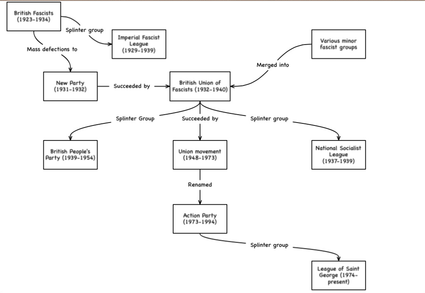National Socialist League
The National Socialist League was a short-lived Nazi political movement in the United Kingdom immediately before the Second World War.
National Socialist League | |
|---|---|
 | |
| Founder | William Joyce John Beckett John Angus MacNab |
| Founded | 1937 |
| Dissolved | August 1939 |
| Split from | British Union of Fascists |
| Newspaper | The Helmsman |
| Ideology | Nazism |
| Political position | Far-right |
| Slogan | Steer Straight |
| |
Formation

The NSL was formed in 1937 by William Joyce, John Beckett and John Angus MacNab as a splinter group from the British Union of Fascists. The leaders claimed that the League had been formed because BUF leader Oswald Mosley was too in thrall to continental fascism, although Mosley contended that the three had simply been sacked from their paid posts in the BUF as part of a cost-cutting exercise.[1] Beckett and Joyce attacked Mosley as being more interested in personal glory than fascism with Beckett claiming he and Joyce wanted no cult of personality but rather were there only as "instruments of a great policy".[2] The formation of the group was announced at 109 Vauxhall Bridge Road in south-west London.[3]
Whatever the truth the NSL began fairly healthily as Joyce secured the financial backing of Alex Scrimgeour, a stockbroker, and soon the NSL was able to publish its own newspaper, The Helmsman, adopting 'Steer Straight' as the party motto.[3] The party's ideology was based on a document published by Joyce entitled National Socialism Now in which he declared his strong admiration for Adolf Hitler but added that what was needed was a specifically British Nazism.[4] The Carlyle Club, a political and social discussion club modelled after the January Club and named for one of Joyce's favourite philosophers Thomas Carlyle, was also established as an arm of the NSL.[5]
Development
Connections were quickly established with the Nordic League, an influential secret society chaired by Archibald Maule Ramsay.[6] Rising far right figure A. K. Chesterton would go on to speak at a number of NSL functions and write for their publications, after leaving the BUF in 1938.[7] Anglo-German Fellowship member and Conservative MP Jocelyn Lucas also developed clandestine links with the NSL.[8] However the NSL also attracted Vincent Collier as a founder member, a propaganda officer in the BUF who also functioned as an agent for the Board of Deputies of British Jews.[9]
In 1938 the NSL became associated with the British Council Against European Commitments, a coalition group chaired by Lord Lymington. Although Joyce quickly tired of this unusual mixture of high society fascists and pacifists Beckett was closer to their ideals and before long he left the NSL to join the British People's Party.[10] Beckett had also become less convinced of following the lead of Nazi Germany in the aftermath of the Munich crisis.[11] Meanwhile, Scrimgeour died in 1938 and surprisingly left nothing to the NSL in his will resulting in the main source of funding being cut off.[12] Alongside this, as was the case for most rival groups on the far-right, the BUF Blackshirts saw the NSL as enemies and were known to attack their rallies and meetings.[13]
Decline
Joyce became embittered and increasingly turned to alcohol whilst politically his vision of a British National Socialism gave way to a more direct copy of German Nazism, with Chesterton stating that he started ending NSL meetings by shouting "Sieg Heil".[14] By 1939 the NSL had been re-registered as a drinking club rather than a political party and one of the group's final meetings in May 1939 ended in chaos as Joyce punched a heckler after the crowd had turned on him for his overtly pro-German speech.[15] On 25 August he handed control of the NSL over to MacNab instructing him that it was his duty to dissolve the movement, which by that time had only 40 registered members.[16] Apart from an index of members that MacNab secreted for possible later use, the League's documents were all destroyed at this meeting.[17] Joyce would depart for Germany just after this meeting and the NSL was wound up.
Towards the end of the Second World War some NSL members regrouped in the Constitution Research Association under Major Harry Edmonds although this initiative had no impact and quickly disappeared.[18]
See also
References
- Benewick 1969, p. 272.
- Griffiths 1983, p. 279.
- Kenny 2003, p. 146.
- Thurlow 1987, p. 171.
- Cole, p. 80
- Thurlow 1987, p. 80.
- Dorril 2007, p. 433.
- Dorril 2007, p. 460.
- Dorril 2007, pp. 413-414.
- Thurlow 1987, p. 172.
- Kenny 2003, p. 149.
- Kenny 2003, p. 147.
- Thurlow 1987, pp. 97-98.
- Kenny 2003, pp. 147-148.
- Kenny 2003, pp. 149-150.
- Kenny 2003, pp. 155-156.
- Cole, p. 88
- Dorril 2007, p. 525.
- Bibliography
- Beckett, Francis (2016). Fascist in the Family: The Tragedy of John Beckett, MP, Routledge.
- Benewick, Robert (1969). Political Violence & Public Order: A Study of British Fascism. Allen Lane. ISBN 978-0713900859.
- Cole, J.A. (1987). Lord Haw-Haw: The Full Story of William Joyce, London: Faber & Faber.
- Dorril, Stephen (2007). Blackshirt: Sir Oswald Mosley and British Fascism. Penguin Books. ISBN 978-0-14-025821-9.
- Griffiths, Richard (1983). Fellow Travellers of the Right: British Enthusiasts for Nazi Germany, 1933-9. Oxford University Press. ISBN 978-0-19-285116-1.
- Holmes, Colin (2016).Searching for Lord Haw-Haw: The Political Lives of William Joyce, Routledge.
- Kenny, Mary (2003). Germany calling : a personal biography of William Joyce, 'Lord Haw-Haw'. New Island. ISBN 1-902602-78-1. OCLC 56538643.
- Thurlow, Richard C. (1987). Fascism in Britain: A History, 1918–1985. Blackwell. ISBN 978-0-631-13618-7.
